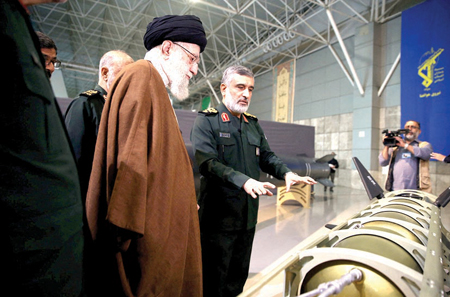“And the rockets’ red glare, and bombs bursting in air..” is a memorable phrase of the United States national anthem, ‘the Star Spangled Banner, written by poet Francis Scott Key, that describes the sustained bombardment of an American fortress by a British Imperial Naval Squadron during the brief US-British War of 1812-14.
 A prestigious Israeli newspaper recently quoted this vivid warfare recounting to describe the experience of Israelis during the past fortnight’s Iranian missile barrages and Israeli counter missile salvos.
A prestigious Israeli newspaper recently quoted this vivid warfare recounting to describe the experience of Israelis during the past fortnight’s Iranian missile barrages and Israeli counter missile salvos.
Literally a few million people in much of West Asia from Tel Aviv to Beirut to Damascus to Hodeida (Yemen) and, most recently, to Tehran and Doha, have been undergoing the traumas of aerial bombardment day and night, even if Americans and Europeans do not. How will the Europeans and Americans know, being safe whole continents and oceans away?
This is a bitter irony because much of the explosives that “burst in air” and cause the “red glare” are industriously produced and constantly supplied by the United States and Europe (except for those sparingly produced by a besieged Iran). But it is more than a mere ‘irony’.
Much worse, scarily, it is a deliberately calculated, sustained, geopolitical strategy. It is a systematic strategy – an actual substantive civilisation – that has globally reigned for literally centuries beginning with classical European colonialism and extending to the recent half-century of neo-imperialist worldwide deployment.
This neo-imperial Western power bloc, with its flourishing, replete, ‘military-industrial complex’, is happily, determinedly (perhaps grimly?), producing and supplying their (former colonial) client states at a distance – be it Pakistan, Israel, Saudi Arabia, or even India. The Western powers do so precisely in order to keep the perceived hungry, under-developed, exploited ‘barbarian hordes’ as far from their gates as possible.
Retreat
The Western onslaught on Iran, fully unprovoked and, therefore, illegal – a ‘war crime’ according to their own ostensible ‘rule book – is but the latest episode of the West’s cruelly ham-handed geopolitics of global dominance in retreat. As some of the West’s own analysts, now turned dissident critics (their own civilisation’s behaviour having shaken them), are pointing out, the Empire in retreat is flailing about in desperation.
Some Western analysts worry that this failing, flailing, Empire may, in its desperation, get even more destructive, harming much of the planetary community and plant itself. That this Western imperial power bloc is failing is apparent in its assault on Iran.
US President Donald Trump has claimed ‘obliteration’ of Iran’s nuclear capabilities. But, the West’s main proxy aggressor, Israel, which has been bearing the main task of defending the Western ‘foothold’ in energy-rich West Asia (and Europe’s vulnerable, immediate, neighbourhood), only claims temporary blunting of its emergent regional rival power (Iran).
Unlike one-time American Secretary of State Hillary Clinton’s threat to ‘obliterate’ the whole of Iran (made on TV in 2008), Washington is currently happy with targeting just Iran’s nuclear infrastructure. But as expert monitoring agencies such as the International Atomic Energy Agency (IAEA) and private monitoring groups are now saying, the claimed ‘destruction’ is by no means total.

The Iranian Supreme Leader inspecting a military facility
But neither Washington nor Tel Aviv (with Prime Minister Benjamin “Bibi” Netanyahu desperately avoiding criminal prosecution) wants any sustained war with Iran which is easily the biggest-sized state in the region in terms of land area (providing geostrategic depth), population (manpower depth), economic sustainability and social consensus. As Israeli media analysts frankly admit, a sustained war of attrition is the last thing the geographically tiny, wholly foreign-subsidised, Zionist State wants.
Twelve days of war with Iran was enough for the Likud regime in terms of its domestic political timetable and agenda. Fugitive Premier Netanyahu (he is wanted by both the International Court of Justice and Israeli courts) simply wants a longer tenure during which he gets time to delay his impending criminal prosecution.
His rightwing Zionist coalition allies are happy with the social unity that was won with the assault on Iran and the fears aroused by Tehran’s counter strikes because that could boost their electoral future. For Netanyahu, an increase in his coalition’s legislative power offers the chance to tinker with the judiciary system to block their capacity to punish his corruption.
Gaza
Hence the speed with which Washington and Tel Aviv went for a ceasefire with Tehran. It had nothing to do with Trumpian diplomacy whatsoever.
This quick ceasefire is in stark contrast with the refusal of the West to agree to a ceasefire in Palestine and its neighbourhood even after 17 months of genocidal aggression by Israel. While Iran, a sovereign country with a solid governance structure and an arms industry, can easily continue a war with Israel, the Palestinians do not have a State with which to wage even an Occupation resistance, let alone an outright war.
Another irony of contemporary world history is that both Israeli and US leaders are evading justice. In fact, the US President has publicly demanded that the Israeli justice system stop holding the Israeli Premier to account for several cases of corruption, the veracity of which most of the Israeli public has little doubt.
Some analysts speculate that Netanyahu would just love to trade a US-lobbied pardon for him by the titular Israeli President in return for his Government’s let-up on its Gaza war – a war which he knows his electorate, including the relatives of the hostages, no longer wants.
More importantly, this past fortnight’s Western aggression against Iran has shaken the whole world system – raising the strategic concerns of States, from global energy supplies to trade logistics to the social well-being of whole continents. These planetary scale strategic concerns – as Sri Lankans are grimly aware – are pushing together whole other clusters of States who, having past experiences of colonial depredations by the Western bloc, now want the safety of counter-balancing numbers and collectives of common interests.
Rising Great Powers, Russia and China, are fully aware that while Israel is only interested in countering a regional rival (and that, too, in accordance with the domestic political timetable of its Government), the backing Western power bloc sees way beyond Iran.
The West, a global empire now in retreat in the face of emerging non-West blocs, especially Russia and China, seeks to blunt the expansion of these new geopolitical forces into West Asia and other border regions or sites of core strategic interests.
NATO
Even if an arrogantly blustering US leadership is the only one to openly say that China is “Enemy No.1”, both Moscow and Beijing (and their friends) know from the actions of Europe that the rest of the Western power bloc is fully in agreement with Washington’s perspective.
Last week’s annual summit meeting of the North Atlantic Treaty Organisation (NATO) held in Dutch capital Den Hague, is being sharply noted by all emerging powers outside the West power bloc for its ostensibly ‘transformational’ turning point in the Alliance. Both NATO leaders and analysts are using this term ‘transformational’.
Western political leaders themselves are hailing the summit’s consensus on bigger military budgeting (being raised to five percent of national expenditure) as well as the common geopolitical focus of the Alliance in the current world context, especially in relation to direct Western ‘spheres of influence’ like Eastern Europe. However, one turning point in Den Hague last week was the clear, if not explicit, message to Ukraine that it cannot enter NATO membership. This point has earlier been mentioned directly and bluntly by US Defence Secretary Pete Hegseth and of course, by Russia, which is however open to European Union (EU) membership for Ukraine.
While only Trump openly talks about China, NATO’s strategic consensus is directly aimed at countering both China’s and Russia’s emerging military-strategic “forever” partnership. It is being done in tandem with the politico-economic strategies of the EU.
Recently, the EU’s aircraft certification agency postponed the airworthiness certification of China’s new C919 airliner developed by the Commercial Aircraft Corporation of China (COMAC). Already serving major cities across China, Beijing hopes that the C919 will compete with Europe’s Airbus A320 and the 737 MAX from US-based Boeing, which has anyway faced a plethora of problems including the latest crash of an Air India 787 Dreamliner. The EU is also blocking further market access to China’s highly popular and cheap electric vehicles from the likes of BYD, Geely, Chery and XPeng, while the US has more or less banned them completely.
The current battering of Iran is seen as a direct threat to both Moscow and Beijing which have long worked with Tehran diplomatically, economically and militarily.
All this disruptive Western geopolitics only encourages the consolidation of emerging new blocs, namely the BRICS economic alliance and the Shanghai Cooperation Organisation (SCO), the mainstay of both of which is China. However, while Beijing provides the financial underwriting, it is Moscow’s nuclear-military umbrella which provides geopolitical assurance.
Despite its current battering from the US and Israel, Tehran will certainly lean eastwards in the coming years. Neither the West nor Israel can do much about that.







